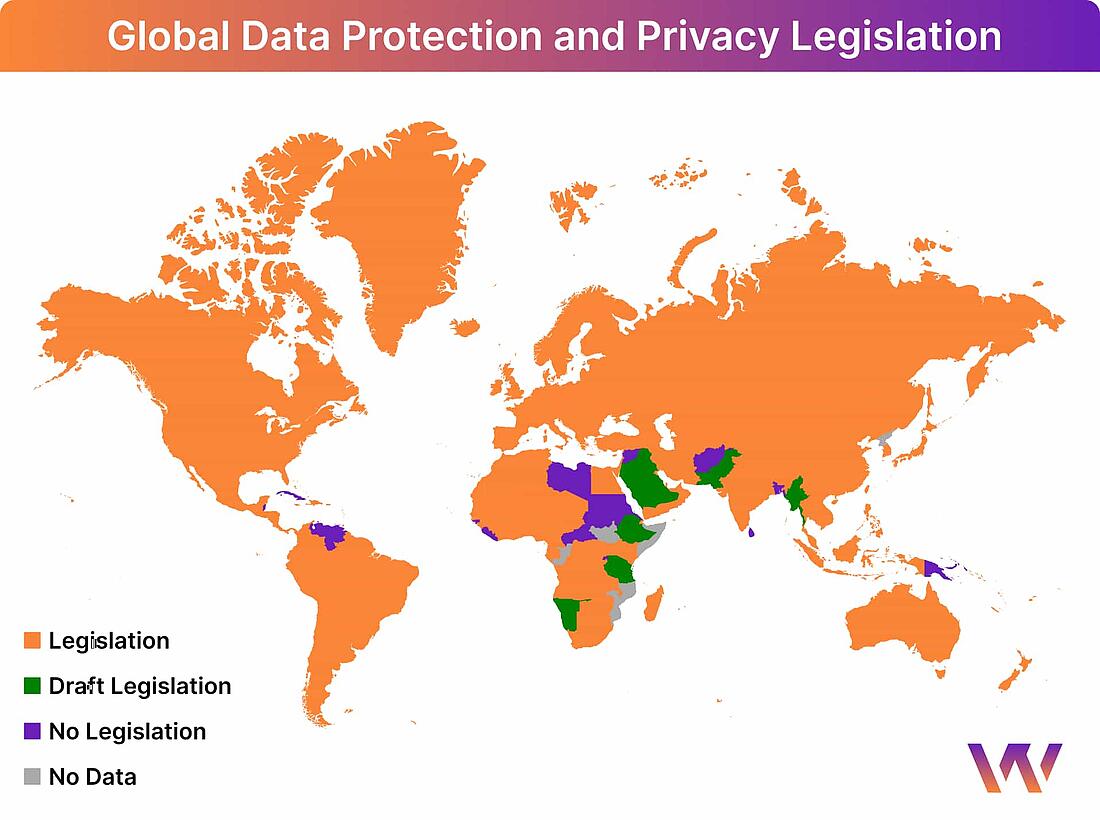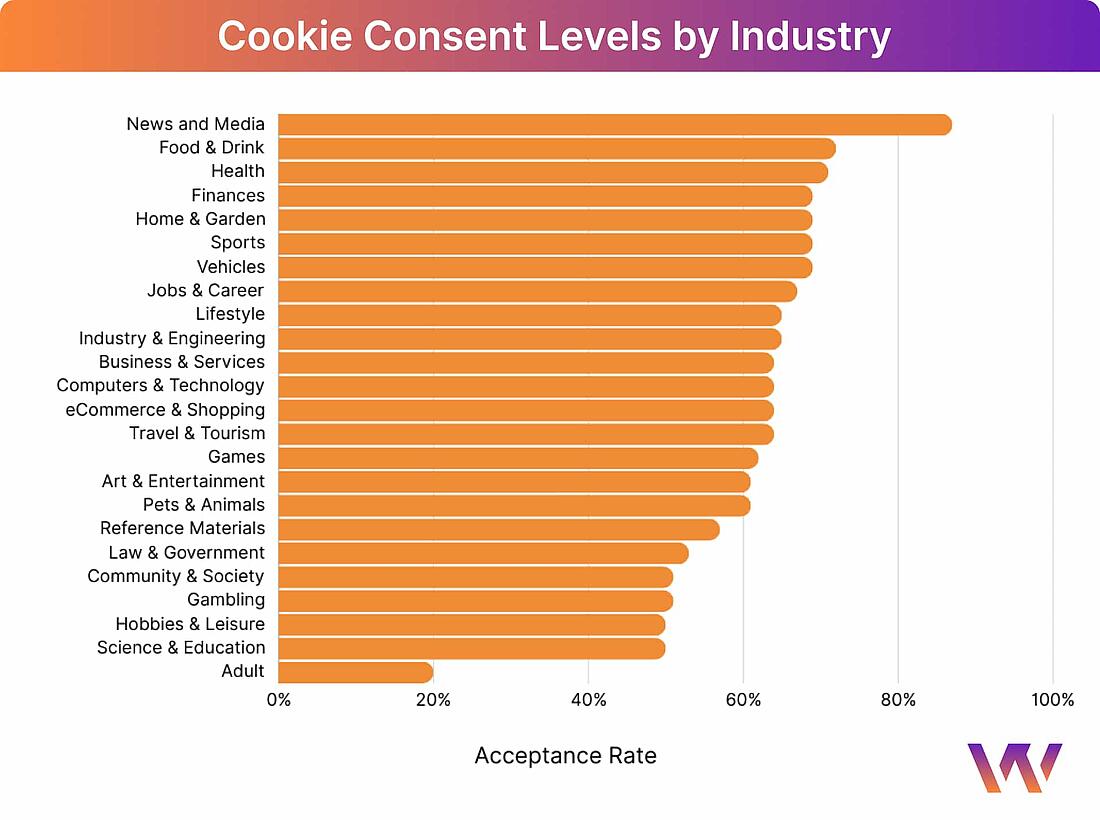- Why Us?
- Features
White Label
For SaaS Platforms & Agencies
Provide our complete analytics suite to your clients, directly within your own interface and with your/their own branding. Discover Analytics-as-a-Service and White Label Analytics. Great benefit, minimal effort.
- Pricing
- White Label
- Success Stories
- ResourcesGetting Started
CONTENTS
- What Is Consent Management?
- Why Consent Management Matters
- Using Consent Management to Navigate Privacy Regulations
- GDPR
- CCPA
- LGPD
- UK GDPR
- PIPEDA (Canada)
- Best Practices for Consent and Preference Management
- Designing Effective Consent Management
- Customization and Personalization
- Recommended Content Management Platforms
- 1. Cookiebot
- 2. CookieYes
- 3. DataGrail
- 4. OneTrust
- 5. Osano
- Problems with Consent Management
- The Solution: Adopt Cookieless Tracking Technologies
Consent Management 101: Master Data Privacy with Confidence

According to Pew Research, 79% of people are concerned about how their online data is used and 59% have little to no understanding about what businesses actually do with it.
These are damning statistics; they underline the importance of robust consent management that clearly explains to internet users exactly what companies do with their personal data, and gives them the right to access, edit, and delete their information on request.
This blog explains exactly what consent management is. In it, you’ll learn about the legal responsibilities that businesses have to protect user data rights, why this matters, and the best content management platforms (CMPs) that will facilitate the process.
But unfortunately, consent management creates a lot of additional responsibilities for businesses and you’ll also learn about cookieless tracking technologies as a way to remove the need for consent management entirely. This saves time and money while enabling businesses to leverage considerably more vital user data without the need for their consent.
Let’s dive in!
What Is Consent Management?
Consent management is a key aspect of data privacy.
It refers to the processes used by businesses to ensure that they have approval from website visitors for the collection, storage, and processing of their personal data.
Cookie banners and privacy policies are the most visible elements of this business area but they represent only the tip of the iceberg. Other key components include:
- Consent Logs: Secure storage of user consents, including details about when and how consent was given, to ensure compliance and facilitate audits.
- User Rights Management: Mechanisms to allow users to exercise their rights under data protection laws, such as accessing their data, requesting corrections, or deleting their information.
- Preference Management Tools: Interfaces that let users manage their preferences regarding the use of their personal data for different services or marketing purposes.
- Data Protection Impact Assessments (DPIAs): Assessments conducted to identify and mitigate risks related to data processing activities.
- Third-Party Data Sharing Controls: Controls and documentation to manage how user data is shared with and used by third-party services and partners.
- Age Verification Tools: Tools to verify the age of users to comply with legal requirements concerning the processing of children’s data.
- Regular Audits and Updates: Regular checks and updates to the consent management processes to ensure ongoing compliance with evolving laws and regulations.
- Training and Awareness Programs: data privacy training for staff on data protection principles and the importance of consent management.
Why Consent Management Matters
Personal data enables the internet to function by allowing for the customization of services, targeted advertising, and improved user experiences, which are key for the business models of many online platforms.
Cookies are the most well known files that hold personal data, but other vessels include local and session storage, indexDB files, server-side databases, and other files like logs and configuration files on both client and server devices.
But regardless of the file type or storage method, users own the data that they leave behind as they move through the internet. This is because personal data includes sensitive information that opens them up to identity theft, fraud, and other malicious activities.
As a result, personal data is tightly controlled by data privacy laws which demand that businesses obtain consent from them before collecting, storing, and processing this information. Businesses that fall short of legal standards risk huge fines and, in extreme cases, can be banned from operating online completely.
There’s also the not-to-small matter of reputation damage. People are also more aware of the dangers posed by the internet to their security than ever before and they are more likely to deal with businesses that have a good reputation for data protection, and less likely to deal with those known to put their data at risk.
Consequently, cookie consent management matters as a key building block of brand reputation and customer trust. And when done well, good privacy processes can foster customer loyalty and position the business as an ethical leader in its field.
But it’s also important to remember that many data privacy laws are extraterritorial in nature. Policymakers create these laws to protect the personal data of their citizens, meaning that they impact businesses regardless of where they are in the world. So for instance, if a business in Ethiopia collects data on even one EU-based website visitor, then they need to adhere to GDPR requirements.
Below, you’ll find a brief introduction to five key laws that underpin consent management requirements.
GDPR
Enacted by the European Union in 2018, the GDPR is one of the most stringent privacy and security laws in the world. It imposes obligations onto organizations anywhere, so long as they target or collect data related to people in the EU. The GDPR requires explicit and informed consent for data processing activities, with strict rules on how consent must be obtained, recorded, and managed.
GDPR consent management is vital because this law is the strictest of its kind anywhere in the world and the model that many other laws around the world. This means that meeting the consent requirements of this law ensures that businesses comply with all global laws.
CCPA
This law came into effect in 2020 in the state of California, USA. While it focuses more broadly on consumer rights and privacy, the CCPA includes provisions for managing consent particularly related to the sale of personal information. It mandates that businesses provide a clear and conspicuous "Do Not Sell My Personal Information" link on their websites that allows Californians to opt-out of the selling of their personal data.
LGPD
Similar to the GDPR, Brazil’s LGPD, which came into effect in 2020, regulates the processing of personal data of individuals in Brazil. The law mandates obtaining explicit consent for certain data processing activities, ensuring that consent is freely given, specific, informed, and unambiguous. It also requires that this consent be easily revoked at any time at the request of the data holder.
UK GDPR
After the United Kingdom left the European Union, it adopted its version of the GDPR, known as the UK GDPR. It retains most of the protections of the EU GDPR, requiring consent to be freely given, specific, informed, and unambiguous. Consent under UK GDPR must also be as easy to withdraw as it is to give, maintaining stringent consent management practices for any business operating within the UK or handling the personal data of UK residents.
PIPEDA (Canada)
This Canadian law applies to private-sector organizations across Canada that collect, use, or disclose personal information in the course of commercial activities. PIPEDA requires organizations to obtain an individual’s consent when they collect, use, or disclose that individual’s personal information, except in certain circumstances. The law emphasizes the need for the consent to be informed and meaningfully given, reflecting clear consent management requirements.
Best Practices for Consent and Preference Management
Businesses that want to build robust consent processes will need to adopt the right content management software, and we’ve outlined our recommendations further down this blog. However, these need to be designed and customized to their exact requirements and those of their customer base.
Designing Effective Consent Management
An effective consent and preference management system will exhibit the following characteristics:
- Clarity and Simplicity: Ensure that the consent forms and user interfaces are straightforward and easy to understand. Avoid legal jargon and use plain language to explain what data is being collected, why it is collected, and how it will be used.
- Granular Choices: Provide users with options to control the type of data they consent to share and its usage. This granularity not only enhances trust but also aligns with stringent legal standards that require explicit consent for processing activities.
- Prominent and Timely Disclosure: Display consent requests in a way that they cannot be overlooked. Ensure that these requests are presented at a relevant time when the user is likely to engage with the content, such as at the time of account creation or before accessing certain website features.
- Easy Consent Withdrawal: Allow users to easily withdraw their consent at any time. This functionality should be as simple as the process used to give consent. Regularly remind users of their rights and provide them with tools to manage their preferences.
- Record Keeping: Maintain a detailed and secure record of when and how consent was obtained and any subsequent updates to the user’s preferences. These records are crucial for compliance and auditing purposes.
Customization and Personalization
Every business and website is unique, with different personal data needs, third-party integrations, and customer interests to consider. The consent management system and processes they adopt needs to reflect this - something that can be done by incorporating the following elements:
- User-Centric Design: Build consent management tools with the user experience in mind. Customizable settings should be intuitive and accessible, enabling users to modify their preferences with minimal effort.
- Contextual Consent: Offer consent options that are tailored to the context of the user’s interaction. For example, provide specific consent options related to particular services or content that the user shows interest in.
- Dynamic User Interface: Implement dynamic interfaces that adapt to user behavior and preferences. For instance, if a user tends to disable certain types of cookies, prioritize these options in the consent interface.
- Feedback Mechanisms: Incorporate mechanisms for feedback on the consent process. Use this feedback to refine and improve the consent experience, ensuring it meets user expectations and compliance requirements.
- Leveraging Technology: Utilize advanced technologies such as artificial intelligence to understand user preferences better and predict which consent options they are most likely to be concerned with. This approach can lead to more personalized and user-friendly consent experiences.
By adhering to these best practices, organizations can ensure that their consent and preference management processes are not only compliant with legal requirements but also enhance user trust and satisfaction. This ultimately contributes to a more transparent and respectful user experience.
Recommended Content Management Platforms
Consent management platforms (CMPs) do much of the heavy lifting when it comes to a company’s adherence to data privacy laws. They exist to help websites to collect and manage the visitor consent that is necessary for the legitimate processing of personal data.
However, they’ve become much more advanced in recent years and can now do everything from data mapping to risk whistleblowing. Below, you’ll find our top five recommendations that make consent collection both easier and more transparent:
Cookiebot is known for:
- Google-Certified CMP built with powerful patented scanning technology.
- Useful monthly reports on cookie usage by websites or applications.
- Ease of use, with extensive customization options and ease of set up.
Cookiebot pricing: Cookiebot offers a 14-day free trial as well as a free forever plan for a single domain with fewer than 50 pages. Pricing plans are then based on the number of domains or web addresses you have as well as the number of subpages included in each, with four options to choose from. Prices start at $7.50 monthly per domain for Premium Lite, and rise to $51 monthly per domain for Premium Large.
CookieYes is known for:
- User-friendliness, thanks to its automated cookie scanner and policy generator.
- Strong track record of increasing acceptance levels and reducing bounce rates.
- Excellent customer support - fast, communicative and present right from the get-go.
CookieYes pricing: CookieYes offers a 14-day free trial. Prices start at $10 per month per domain for their Basic package and increase to $40 per month per domain for this consent management platform’s Ultimate package, though users who pay annually get a discount that equates to two free months over the course of a year.
3. DataGrail
DataGrail is a privacy-first solution that enterprises can use to manage personal data in line with privacy laws. Founded in 2018 and with advanced automation technology, this consent manager has proven popular with large businesses looking to control company-wide data privacy processes in one place.
DataGrail is known for:
- The first bespoke privacy management platform to future-proof global compliance.
- Automated mapping, request management, and guided privacy assessments.
- Top-rated data privacy and security platform on G2.
DataGrail pricing: DataGrail doesn’t offer a free trial or freemium service and their pricing structure isn’t available publicly on their website. Instead and as an enterprise solution, they provide personalized payment plans. These quotations are based largely on company headcount, which at 200 will cost anything between $16,300 and $32,200 annually.
4. OneTrust
OneTrust is another advanced content management platform that enables businesses to manage privacy, security, compliance, and governance requirements in one place, with a unified interface that departments can use to monitor consent, map their data flow, and identify risk.
OneTrust is known for:
- An intuitive interface through which to manage governance, risk, and compliance.
- Useful tool for avoiding data breaches by mitigating issues before they happen.
- Impressive all-on-one solution with real synergy between the different tools.
OneTrust pricing: OneTrust offers a 14-day free trial but no freemium option. Their packages are fully customizable, with businesses able to choose the features that they want to start with. And while this cookie consent manager’s pricings isn’t publicly available, the privacy essentials product suite will set businesses back $3,680 per month if they go with all the features on offer.
5. Osano
Osano is a simple, all-in-one data privacy platform that is currently being used by over 750,000 companies to build, manage, and scale their data privacy programs. The software efficiently collects and stores visitor consent, while protecting businesses against wider data compliance risks.
Osano is known for:
- Strong blockchain consent logging that protects businesses against legal action.
- World class customer service, with knowledgeable and present support agents.
- Proactively blocks any unsanctioned third-party data actions.
Osano pricing: Osano offers a free forever plan for single users with one sole domain, with this service limited to 5,000 monthly visitors. Prices start at $199 per month and can increase to over $549 for businesses with multiple domains and lage traffic volumes.
Problems with Consent Management
Many websites and their third-party integrations need visitor data to function as intended, with analytics platforms a perfect example in this regard.
Businesses need to obtain consent for this, and consent management platforms are a highly effective way to achieve this. However, this means that companies are only able to collect data on visitors that do consent to their cookie banners and the likelihood that they will give this consent varies considerably from industry to industry.
As you can see from the above chart, porn websites experience the lowest level of visitor consent and media outlets the highest but most website types obtain consent from their customers 60 to 70% of the time.
Of course, it’s a little more complicated than that and we’ve written elsewhere about the even smaller amount of legitimate data that businesses actually collect when other factors are taken into account. We've also gone into detail about how you can set your business up so that you don't even need a cookie banner or consent management system.
Read the Blog: Why You Don't Actually Need a Cookie Banner
What this means is that businesses that rely on cookie banners - and hope that their cookie practices will be accepted by internet users - lose a huge amount of highly valuable data that would otherwise help them to understand their customers better, build a better website, and sell more products (among other things).
The Solution: Adopt Cookieless Tracking Technologies
Businesses can drop the need for consent altogether - and with it the need for expensive content management platforms - by adopting cookieless tracking technologies.
And since these platforms don’t collect personal data, they can be used legitimately without the need for internet user consent. TWIPLA is a good example in this regard; our clients have found that they’re collecting up to five times more visitor data that had been invisible to them when using cookie-based analytics.
The advantage of this speaks for itself: more data means more accurate insights, and far better guidance that businesses can use to optimize their websites, sell more products, and better allocate resources.
It also saves businesses money. Even our top-tier package costs less than the content management platform that websites need when using cookie-based alternatives like Google Analytics. And by removing the need for a cookie banner, businesses have a far more attractive website with a much better user experience.
So if you’re finding that privacy compliance and consent management is too complex and time consuming, then sign up to TWIPLA for free and start using analytics legitimately without the need for a CMP.
Share article
Get Started for Free
Gain World-Class Insights & Offer Innovative Privacy & Security












